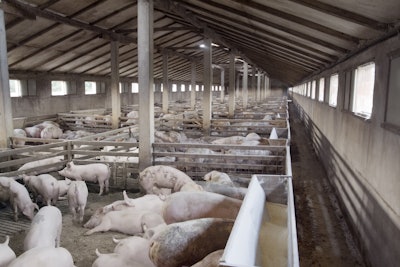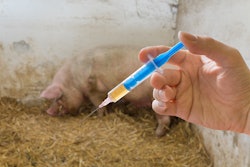
In the second week of August, African swine fever (ASF) virus was detected at three commercial swine farms in Estonia.
Affected herds comprised 340, 1,973 and 6,742 animals, respectively, according to recent notifications to the World Organisation for Animal Health (WOAH). The affected facilities were in the central county of Viljandi, and the adjacent areas of Tartu and Pölva to the east. They bring the nation’s total outbreaks in this population so far this year to eight.
Located in Pölva, the largest of these latest herds to be affected is owned by Atria Plc.
Among the leading meat companies in the region, Finland-based Atria Plc reports that this is the second ASF outbreak to be confirmed at its facilities in Estonia. Presence of the virus was previously confirmed at another of its units in the country in June.
As the latest outbreak was confirmed, the firm confirmed that the farm was depopulated, and the facilities were undergoing thorough cleaning and disinfection, under the direction of the local authorities. ASF poses no risk to human health, and none of Atria's products from Estonia have been directed to other markets.
Set to receive EUR400,000 (US$468,000) from the Estonian state, the company says the direct financial impact of the ASF outbreak on its business will be minimal. Its customers will receive deliveries from alternative sources, and production at the farm is expected to return to normal without a few months.
7 European countries report new outbreaks in domestic pigs
During the past week, 24 new ASF outbreaks in the domestic pig population have been reported across eastern and central Europe.
This is according to the European Commission (EC), and covers the period August 14-20. Through its Animal Disease Information System database, the EC monitors cases of listed animal diseases in European Union member states and selected adjacent countries.
Of these latest outbreaks, 17 were recorded in Romania, three in Estonia, and one in each of Lithuania, Moldova, Poland and Serbia, the source reports.
So far this year, 13 states have registered 501 outbreaks involving domestic swine with the EC system. Romania has logged the highest total at 270, followed by Serbia (102) and Moldova (44).
For comparison, 16 countries recorded a total of 764 outbreaks in this category with the system during the whole of last year.
Further details on these developments are revealed in official notifications to WOAH from the national animal health agencies.
Although widespread across eight counties, all the Romanian outbreaks involved backyard herds, each comprising no more than 30 swine.
As in Estonia, the only new outbreak in Poland also involved a commercial farm. Located in the northwestern province of West Pomerania, the affected premises had close to 4,500 pigs. It is Poland’s 12th farm ASF outbreak in 2025.
Also testing positive for the ASF virus over the past week were two backyard herds in Bosnia-Herzegovina and two in Moldova.
10 European states register new cases in wild boar
As of August 20, 18 countries in the region had registered a total of 7,721 ASF outbreaks in their respective wild boar populations this year.
This compares with a total of 7,892 outbreaks in 21 states during the whole of 2024.
In the period August 14-20, 10 countries confirmed 109 additional cases, including 29 in Poland and 19 in Germany.
So far in 2025, Poland’s total in this category is the largest at 2,634, followed by Germany (1,756), Latvia (765) and Hungary (671).
Ukraine’s animal health agency has notified WOAH about the recent re-emergence of ASF in its Transcarpathia region. After a hiatus of a little over two years, three animals tested positive for the ASF virus. They were found dead in close proximity to the borders with Hungary and Romania.
In Germany, the majority of recent cases in wild boar — 67 in August — have been identified in the western state of North Rhine-Westphalia (NRW; 53 cases), and the others in adjacent Hesse. This is according to national veterinary agency, the Friedrich-Loeffler Institute, as of August 22.
A 45-kilometer wildlife fence has now been completed in NRW, reports German website Schweine. Surrounding the core ASF area in the district of Olpe, hunting is now being encouraged within the boundary, with the aim to eradicate as many wild boar as possible. Previously, hunting there was strictly controlled, in order to reduce the risk of infected animals spreading the virus to new areas.
Ghana raises ASF alert
Presence of the ASF virus was confirmed in mid-August in the southeastern region of Volta of the West African state, reported the Ghana News Agency.
Warned to be on high alert by the veterinary services are pig farmers in South Tongu district after more than 200 pigs died in the district capital, Sogakope.
In order to prevent the spread of infection to other districts in the Volta Region and more widely, owners of swine are being urged to raise biosecurity around their animals. Furthermore, tracing of contact animals is being carried out through local communities and farmer groups.
Further outbreaks in 2 Indian states
Presence of the ASF virus has recently been confirmed in the Idukki district of Kerala, reported Onmanorama.
This came after the deaths of several pigs in this area in the southern state. By the time the disease was diagnosed, almost all the animals at the affected farms had died. However, the authorities have imposed controls on the movement and sale of live swine, pork products and feed within a 10-kilometer radius of the outbreaks. Furthermore, checkpoints have been set up at border crossings to prevent incoming transport of these products from other states.
It appears this may be the first ASF outbreak in Kerala in 2025.
Meanwhile, in the northeastern state of Assam, ASF has re-emerged in one district. After detection of the virus, 18 pigs have been culled in one area of Lakhimpur district, reported Assam Tribune in recent days.
Authorities there have launched similar disease control measures to those in Kerala.
ASF developments elsewhere in Asia
Last week, Antara News reported that Indonesia’s agriculture ministry was celebrating a successful initiative on ASF control in West Kalimantan.
Focus of the project had been on improving biosecurity and raising awareness of the disease among the province’s small-scale farmers through community efforts.
After several recent outbreaks in Penang state in Western Malaysia, officials have warned farmers not to misuse licenses for the movement of pigs. They stress that the authorizations should not be used to transport sick animals to the slaughterhouse, according to Bernama.
As of August 20, it reported that ASF outbreaks had been confirmed at four farms in Penang, and around 20 pigs at slaughterhouses had tested positive for the virus.
This month, ASF was detected in a pig in Samar province in the Eastern Visayas region of the Philippines. After confirmation, Leyte Samar Daily News reported that control measures were introduced around the affected town, including animal health checkpoints.
Latest update on the ASF situation in Asia from the United Nation’s Food and Agriculture Organization (FAO) refers to a single outbreak in the south of the People’s Republic of China.
ASF tests were positive after more than 200 of the 795 swine in a village herd died in mid-July.
The outbreak occurred in the Baise city area in Guangxi Zhuang Autonomous Region. Source of the infection is uncertain. However, the outbreak appears to be within five kilometers of the border with Vietnam.
These are the first reported cases in this Chinese region since March 2019.
Meanwhile, ASF continues to cause widespread outbreaks in the Vietnamese swine population, according to the FAO. Citing local media, it reports that all 34 cities/provinces in Vietnam had recorded ASF cases in 2025, with 1,019 outbreaks confirmed by August 6. More than 160,000 swine have been culled this year to control the spread, including around 73,500 during the month of July alone.
View our continuing coverage of the global African swine fever situation.
Japan: first CSF case in Fukuoka
In mid-August, the agriculture ministry confirmed the first case of classical swine fever (CSF) in Fukuoka. Testing positive for the virus was a wild boar.
Fukuoka is located on the southernmost main island of Kyushu.
Among wild boar, thousands of cases have been detected widely across the country since 2018.
Additionally, there have been 99 confirmed CSF outbreaks in domestic pigs in Japan. These include five since the start of 2025, with the most recent confirmed in early May.
Like ASF, CSF (also known as hog cholera) is a notifiable disease that affects members of the pig family, according to the WOAH CSF page. Both diseases cause devastating losses in domestic and wild populations, but do not impact human health. Despite the similar names and impacts, CSF and ASF are caused by unrelated viruses.
To date, ASF virus has not been detected in Japan.

















